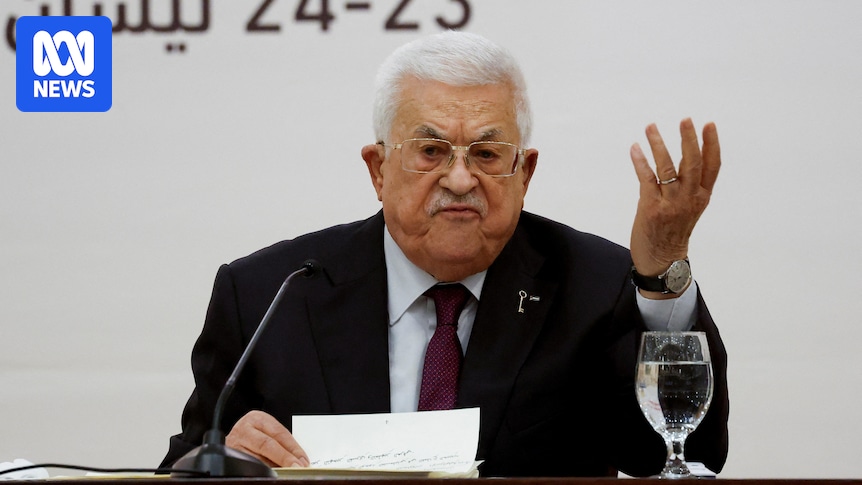Palestinian Leader Abbas Condemns Hamas, Demands Hostage Freedom
Editor’s Note: Palestinian President Mahmoud Abbas has strongly condemned Hamas' actions and demanded the immediate release of all hostages. This developing situation is creating significant international concern.
Why This Matters
The recent Hamas attack and hostage-taking have dramatically escalated tensions in the Israeli-Palestinian conflict. This article will examine President Abbas's condemnation, its implications for the ongoing crisis, and the international community's response. We will analyze the key aspects of this evolving situation, including the humanitarian crisis, the political fallout, and the potential for further escalation. Understanding Abbas's position is crucial for comprehending the complexities of this conflict and predicting future developments. This affects global security, humanitarian aid efforts, and the future of peace negotiations.
Key Takeaways
| Takeaway | Description |
|---|---|
| Abbas Condemns Hamas | President Abbas has explicitly denounced Hamas' actions as unacceptable and a betrayal of the Palestinian cause. |
| Demand for Hostage Release | He has unequivocally demanded the immediate and unconditional release of all hostages held by Hamas. |
| Potential for Factions | The incident could deepen divisions within the Palestinian territories. |
| International Pressure Mounts | The international community is applying increasing pressure on Hamas to negotiate a peaceful resolution. |
| Uncertain Future for Peace Negotiations | The attacks cast a significant shadow over the prospects for future peace negotiations and reconciliation efforts. |
Palestinian Leader Abbas Condemns Hamas, Demands Hostage Freedom
The recent attacks by Hamas on Israel and the subsequent hostage crisis have prompted a swift and strong reaction from Palestinian President Mahmoud Abbas. In a televised address, Abbas unequivocally condemned Hamas' actions, describing them as a grave violation of Palestinian national interests and a betrayal of the ongoing struggle for statehood. He emphasized that Hamas' actions are not representative of the Palestinian people and have undermined years of efforts toward peace and reconciliation.
Key Aspects of Abbas's Response:
- Unconditional Condemnation: Abbas’ statement left no room for ambiguity, firmly rejecting the violence and the taking of hostages.
- Demand for Hostage Release: He stressed the urgent need for the immediate and unconditional release of all hostages, prioritizing their safety and well-being.
- Call for Calm: Abbas appealed to all parties to exercise restraint and avoid further escalation of the conflict.
- Rejection of Violence: He reiterated his commitment to a peaceful resolution to the Israeli-Palestinian conflict.
Detailed Analysis of Abbas's Position:
Abbas's condemnation is significant not only for its clarity but also for its potential impact on the internal dynamics of Palestinian politics. While Fatah and Hamas have historically been rivals, this event represents a major rupture. Abbas' strong denouncement aims to distance Fatah from Hamas' actions, potentially solidifying international support for his more moderate approach. However, this public rift may also exacerbate tensions within Palestinian territories.
The International Community's Response
The international community, including the United Nations, the United States, and the European Union, has largely aligned with Abbas’ condemnation. Many countries have expressed strong support for the release of the hostages and have called for de-escalation. International pressure on Hamas is mounting, with some countries threatening sanctions and other punitive measures if the hostages are not released swiftly.
People Also Ask (NLP-Friendly Answers)
Q1: What is the significance of Abbas's condemnation of Hamas?
A: Abbas's condemnation is significant because it signals a clear rejection of Hamas' actions by the internationally recognized Palestinian leadership, potentially impacting international perceptions and support.
Q2: Why is the hostage situation so critical?
A: The hostage situation is critical because it represents a major humanitarian concern and significantly increases the risk of further escalation and violence in the already tense region.
Q3: What are the potential consequences of Hamas' actions?
A: Hamas' actions could lead to increased international isolation, further hindering the prospect of a two-state solution and potentially triggering more conflict.
Q4: How might this affect peace negotiations?
A: This event drastically complicates the prospects for future peace negotiations, potentially delaying or derailing them indefinitely.
Q5: What role can the international community play?
A: The international community can play a crucial role in mediating a resolution, applying pressure for the release of hostages, and working towards de-escalation and a peaceful solution.
Practical Tips for Understanding the Israeli-Palestinian Conflict
- Follow reputable news sources: Stay informed through trusted media outlets to avoid misinformation.
- Understand the historical context: Familiarize yourself with the long history of conflict to better understand the current situation.
- Consider multiple perspectives: Seek out diverse viewpoints from both Israeli and Palestinian sources.
- Engage in respectful dialogue: Discuss the conflict with others, fostering understanding and empathy.
- Support humanitarian aid: Contribute to organizations providing aid to those affected by the conflict.
Summary
President Abbas' condemnation of Hamas' actions and demand for the release of hostages represent a critical juncture in the ongoing Israeli-Palestinian conflict. This event highlights the deep divisions within Palestinian society and casts a long shadow over future prospects for peace. The international community's response will be crucial in determining the next steps in this evolving and highly volatile situation.
Closing Message
The situation remains highly fluid and unpredictable. The actions of Hamas and the responses from various actors will determine the trajectory of this conflict in the coming weeks and months. It is imperative that all sides prioritize peaceful resolution and the well-being of all civilians caught in this escalating crisis. What steps do you think are necessary to de-escalate the situation?
Call to Action
Stay informed about this developing situation by subscribing to our newsletter for updates on the Israeli-Palestinian conflict. Share this article to spread awareness and encourage constructive dialogue.
(Hreflang tags would be added here based on the target language for translation)

